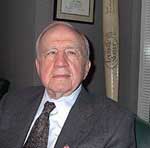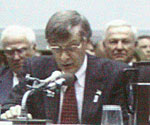By Mark Zdechlik
Minnesota Public Radio
December 7, 2001
|
| RealAudio |
In an exclusive interview with Minnesota Public Radio, Minnesota Twins owner Carl Pohlad confirmed Major League Baseball has singled out the Twins and the Montreal Expos as the franchises that would fold if baseball contraction goes as planned. Pohlad has become the focal point of fan anger and criticism over the prospect the Twins will vanish.
For Pohlad, owning the Twins has been a bittersweet pursuit late in his life. World Series championship celebrations gave way to accusations of greed and misrepresentation. Pohlad wanted to be the man who saved baseball in Minnesota. Instead he's become one of the most vilified people in the state.
| |
|
|
|
||
From offices with a breathtaking bird's-eye view of Minneapolis, Carl Pohlad talked about his roots, his career and the future of the Minnesota Twins. His son, Jim, watched from the opposite end of the conference room.
Pohlad, a member of Major League Baseball's Executive Committee, confirmed for the first time that his fellow owners, looking for ways to improve the business, determined his franchise and the Montreal Expos no longer fit with baseball's goals.
"Baseball didn't go into this blindly," Pohlad said. "They did a lot of market studies. They had a point system, the performance of baseball teams at a given town and they developed a lot of statistics that said Montreal and Minneapolis - or Minnesota - simply doesn't meet the test of being able to field a winning team because of the economics."
Pohlad says he does not know the time line for contraction, nor is he aware of anything that could be done now to preserve professional baseball in Minnesota as the league prepares to shrink.
"Our family doesn't want to get out of baseball. When you say, 'Will you support it?' sometimes what you want to do and what you end up doing can be driven by a number of factors."
In this case, Pohlad says it's simply of a matter of money; he can no longer justify spending his family's money to prop up the Twins.
|
"People would say, 'Sure, you'd stick up (for him). He's a business partner.' But I don't have to sit here and talk to you; I could just say, 'Hey, no comment.' The fact is I believe what I'm saying. The fact is that Carl is a good person."
- Irwin Jacobs |
Pohlad will not say how much he's lost.
He says he's willing to sell the Twins, but he will not say for how much. Pohlad says he's had no serious offers.
"For the last 10 years we've been working hard to get a stadium. We've spent millions of dollars in that effort in the legislative session and we were never able to get it done. As a result of that, you finally get tired of underwriting all of the losses that we've have had in baseball and it wasn't fair to my family or our business."
Despite his business success and wealth, most Minnesotans had no idea who Carl Pohlad was until 1984, when he bought the Minnesota Twins for $36 million. He says he did it to keep the team from moving to Florida.
Soon Pohlad became a household name around the region, then a hero when - less than three years after buying the Twins - Minnesota made it to the World Series in 1987 and won.
Public acclaim for Pohlad grew when another world championship followed in 1991. But the Twins' success on the field eroded and Pohlad determined that playing at the Metrodome was a losing prospect. The man who saved baseball in Minnesota quickly became the focus of a polarized debate over public financing for a new stadium, questioning the logic of taxpayers footing any of the bill to sustain a billionaire owner and multi-millionaire athletes.
World Series glory faded and was replaced by disdain for Pohlad, which grew with each failed stadium plan.
| |
|
|
|
||
A popular Twin Cities radio station sponsored a Carl Pohlad and baseball commissioner Bud Selig effigy contest outside a St. Paul bar early one morning this fall. The few listeners who turned out had no problem attracting support from passing motorists.
Mark Williams was among the group.
"I mean he's got the money. He could work out arrangements. Everyone wants a stadium but no one wants to put up the money," he said.
Pohlad says he's never been comfortable with the attention that's come with owning the Twins. Friends and family members are troubled by the prospect that Carl Pohlad's legacy could be that of a scrooge who brought about the demise of the Minnesota Twins.
"Clearly, I believe my dad is misunderstood," says his son, Jim.
Carl Pohlad was born in 1915 in West Des Moines, Iowa. In stark contrast to his current circumstances, Pohlad was poor, part of a large immigrant family living literally on the wrong side of the tracks.
"You had the immigrants and then the other people in the other part of town and I remember that kind of generated a class distinction. You might say I developed somewhat of an inferiority complex which has, I think, stayed with me," the elder Pohlad says.
Still, Pohlad says he fondly remembers working alongside his mother and father and several brothers and sisters. They washed other people's clothes and cleaned homes.
| |
|
|
|
||
"That kind of educated us a little bit about the value of money and work ethic; a nickel or a dime really meant something."
Pohlad won a football scholarship to college but dropped out to sell used cars before being drafted into World War II infantry combat. In 1949 Pohlad went to work with his brother-in-law at Marquette National Bank in Minneapolis.
Five years later Pohlad was in charge. He built the business into one of the nation's largest privately-held banks. Among other things, he's had major investments in several airlines, and one of the nation's largest Pepsi Cola bottling companies.
In September Fortune Magazine estimated his net worth at $1.8 billion. That was before the recent sale of most of his banking assets to Wells Fargo. Some estimates now put his worth at close to $3 billion.
Pohlad isn't interested in discussing those figures.
"I wouldn't care to speculate. I have not counted it so I don't know what I'm worth," he says.
Although he's troubled by hip and back problems, Pohlad continues to work. He loves making deals.
"There's a thrill in accomplishment and that's true whether you're talking about a dollar or a million dollars. The value isn't so much as the allure of being a success at whatever you start out to do."
Investor Irwin Jacobs came to know Pohlad after approaching him for a loan in the mid-1970s. "After the first transaction I had with him as a customer, we became partners and we've been partners in many things over the last 25 years," according to Jacobs.
Jacobs is one of few people close to Pohlad willing to talk about the billionaire. "I remember the day Carl called me up and said to me, 'I'm buying the Twins,'" he says.
Jacobs says Pohlad offered him a stake in the team, but he declined, citing concerns about baseball's economics. Jacobs is a staunch defender of the Pohlads. He blames the media in large part for Pohlad's vilification.
"People would say, 'Sure, you'd stick up (for him). He's a business partner.' But I don't have to sit here and talk to you; I could just say, 'Hey, no comment.' The fact is I believe what I'm saying. The fact is that Carl is a good person," Jacobs says.
The sharpest blow to Pohlad's public standing grew from the 1997 stadium plan. Officials initially said Pohlad would contribute $80 million of his own money, but it turned out that he had offered a loan, not a grant.
Former Republican governor Arne Carlson, a Pohlad supporter, spent considerable political capital unsuccessfully fighting for a stadium. "That $80 million that was really part of the deal all of the sudden became a loan that collapsed everything and it also collapsed the credibility, and from that time on it's become almost an impossible subject to deal with," Carlson said. The Pohlads say the whole thing was a misunderstanding; they didn't intend to mislead anyone. Carl Pohlad says he doesn't want to be labeled as the man who destroyed baseball in Minnesota. But what he sees as his only alternative - building a stadium - isn't something he's willing to do.
"How much shall I pay for a legacy? Shall I pay a couple of hundred million dollars just for the privilege of showing baseball in the state of Minnesota? No. You wouldn't do it and neither would anybody else."



